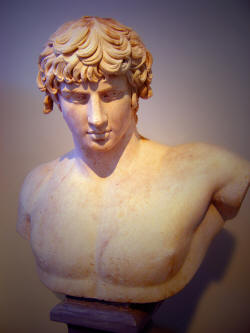

Queer Places:
Hadrian's Villa, Tivoli
 Antinous (27 November, c. 111 – before 30 October 130[a]) was a Bithynian Greek youth and a favourite beloved of the Roman emperor Hadrian.[1] After his premature death before his twentieth birthday, Antinous was deified on
Hadrian’s orders, being worshipped in both the Greek East and Latin West, sometimes as a god (theos) and sometimes merely as a hero (ἥρως, hḗrōs).[2]
Little is known of Antinous's life, although it is known that he was born in Claudiopolis (present day Bolu, Turkey), in the Roman province of Bithynia et Pontus. He was probably introduced to Hadrian in 123, before being taken to Italy for a higher education. He had become the favourite of Hadrian by 128, when he was taken on a tour of the Roman Empire as part of Hadrian's personal retinue. Antinous accompanied Hadrian during his attendance of the annual Eleusinian Mysteries in Athens, and was with him when he killed the Marousian lion in Libya. In October 130, as they were part of a flotilla going along the Nile, Antinous died amid mysterious circumstances. Various suggestions have been put forward for how he died, ranging from an accidental drowning to an intentional human sacrifice or suicide.
Following his death, Hadrian deified Antinous and founded an organised cult devoted to his worship that spread throughout the Empire. Hadrian founded the city of Antinoöpolis close to Antinous's place of death, which became a cultic centre for the worship of Osiris-Antinous. Hadrian also founded games in commemoration of Antinous to take place in both Antinoöpolis and Athens, with Antinous becoming a symbol of Hadrian's dreams of pan-Hellenism. The worship of Antinous proved to be one of the most enduring and popular of cults of deified humans in the Roman empire, and events continued to be founded in his honor long after Hadrian's death.[3]
Antinous became associated with homosexuality in Western culture, appearing in the work of
Oscar Wilde and
Fernando Pessoa.
Antinous (27 November, c. 111 – before 30 October 130[a]) was a Bithynian Greek youth and a favourite beloved of the Roman emperor Hadrian.[1] After his premature death before his twentieth birthday, Antinous was deified on
Hadrian’s orders, being worshipped in both the Greek East and Latin West, sometimes as a god (theos) and sometimes merely as a hero (ἥρως, hḗrōs).[2]
Little is known of Antinous's life, although it is known that he was born in Claudiopolis (present day Bolu, Turkey), in the Roman province of Bithynia et Pontus. He was probably introduced to Hadrian in 123, before being taken to Italy for a higher education. He had become the favourite of Hadrian by 128, when he was taken on a tour of the Roman Empire as part of Hadrian's personal retinue. Antinous accompanied Hadrian during his attendance of the annual Eleusinian Mysteries in Athens, and was with him when he killed the Marousian lion in Libya. In October 130, as they were part of a flotilla going along the Nile, Antinous died amid mysterious circumstances. Various suggestions have been put forward for how he died, ranging from an accidental drowning to an intentional human sacrifice or suicide.
Following his death, Hadrian deified Antinous and founded an organised cult devoted to his worship that spread throughout the Empire. Hadrian founded the city of Antinoöpolis close to Antinous's place of death, which became a cultic centre for the worship of Osiris-Antinous. Hadrian also founded games in commemoration of Antinous to take place in both Antinoöpolis and Athens, with Antinous becoming a symbol of Hadrian's dreams of pan-Hellenism. The worship of Antinous proved to be one of the most enduring and popular of cults of deified humans in the Roman empire, and events continued to be founded in his honor long after Hadrian's death.[3]
Antinous became associated with homosexuality in Western culture, appearing in the work of
Oscar Wilde and
Fernando Pessoa.
It is unknown exactly where Antinous's body was buried. It has been argued that either his body or some relics associated with him would have been interred at a shrine in Antinoöpolis, although this has yet to be identified archaeologically.[48] However, a surviving obelisk contains an inscription strongly suggesting that Antinous's body was interred at Hadrian's country estate, the Villa Adriana at Tibur in Italy.[49]
My published books: